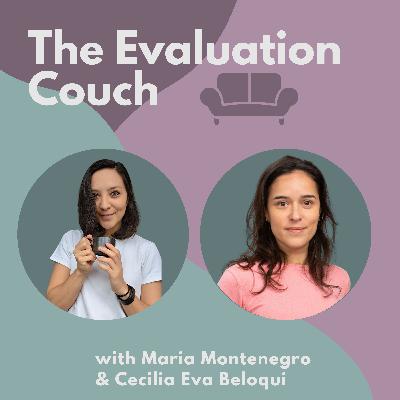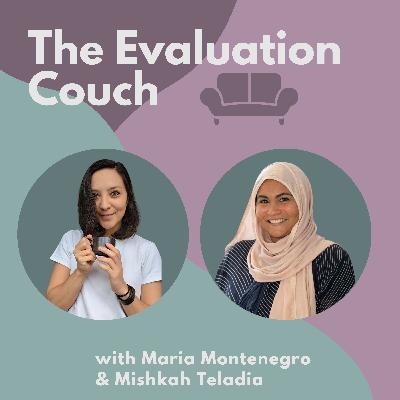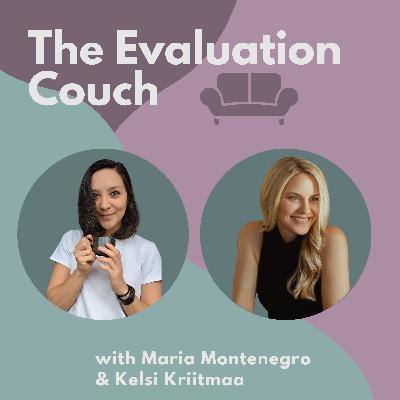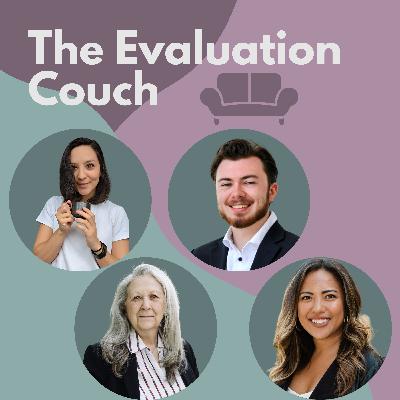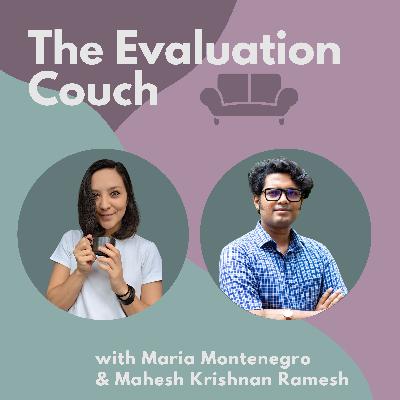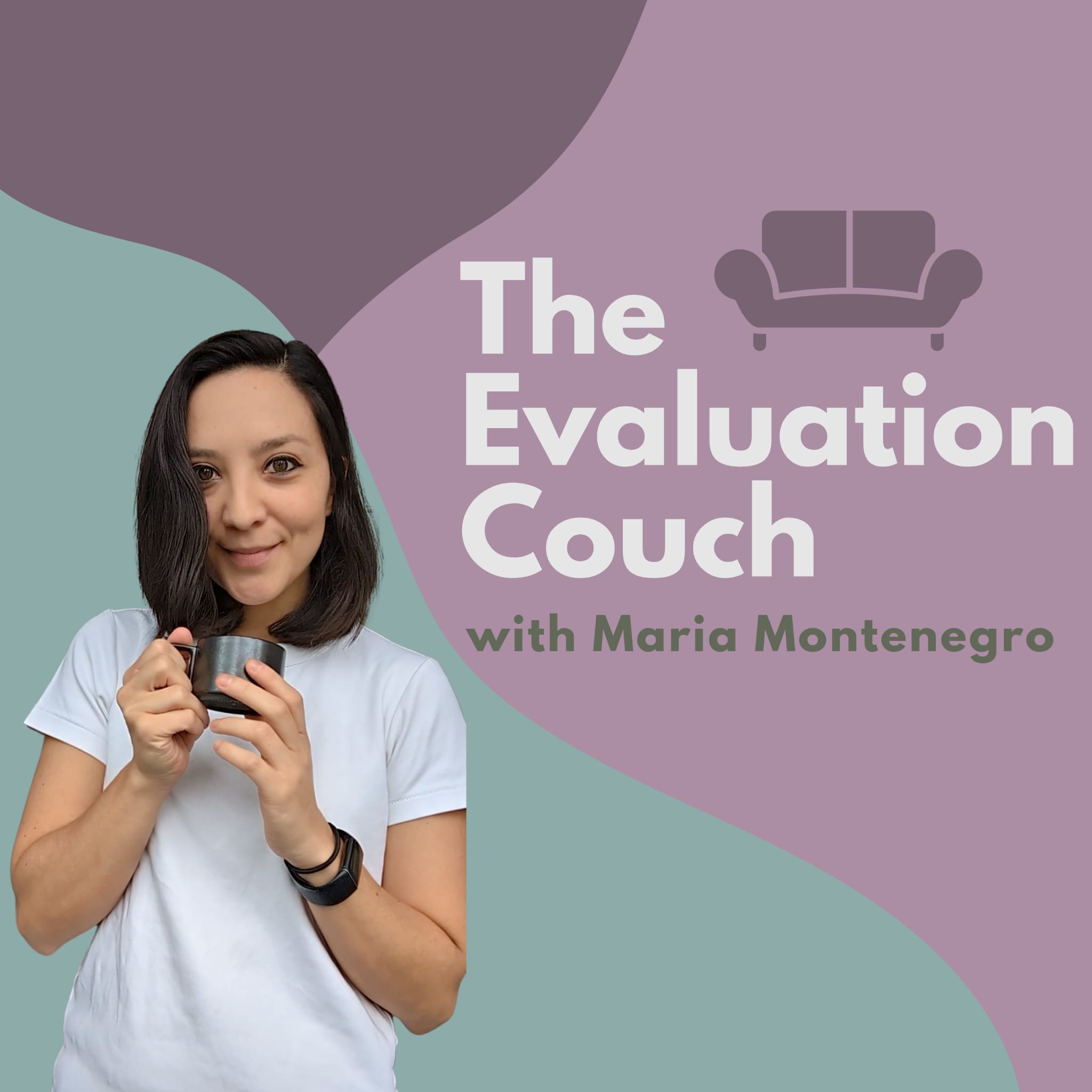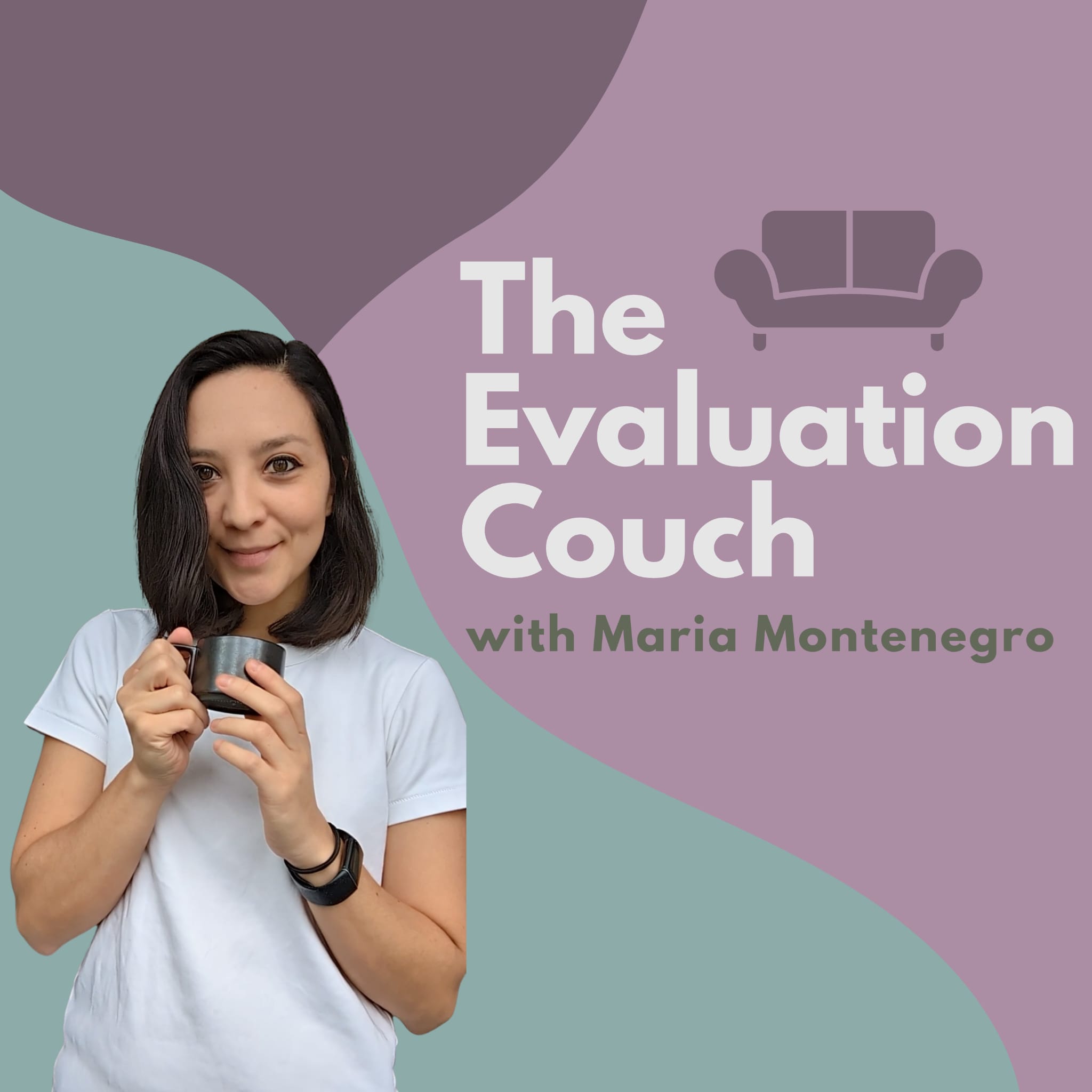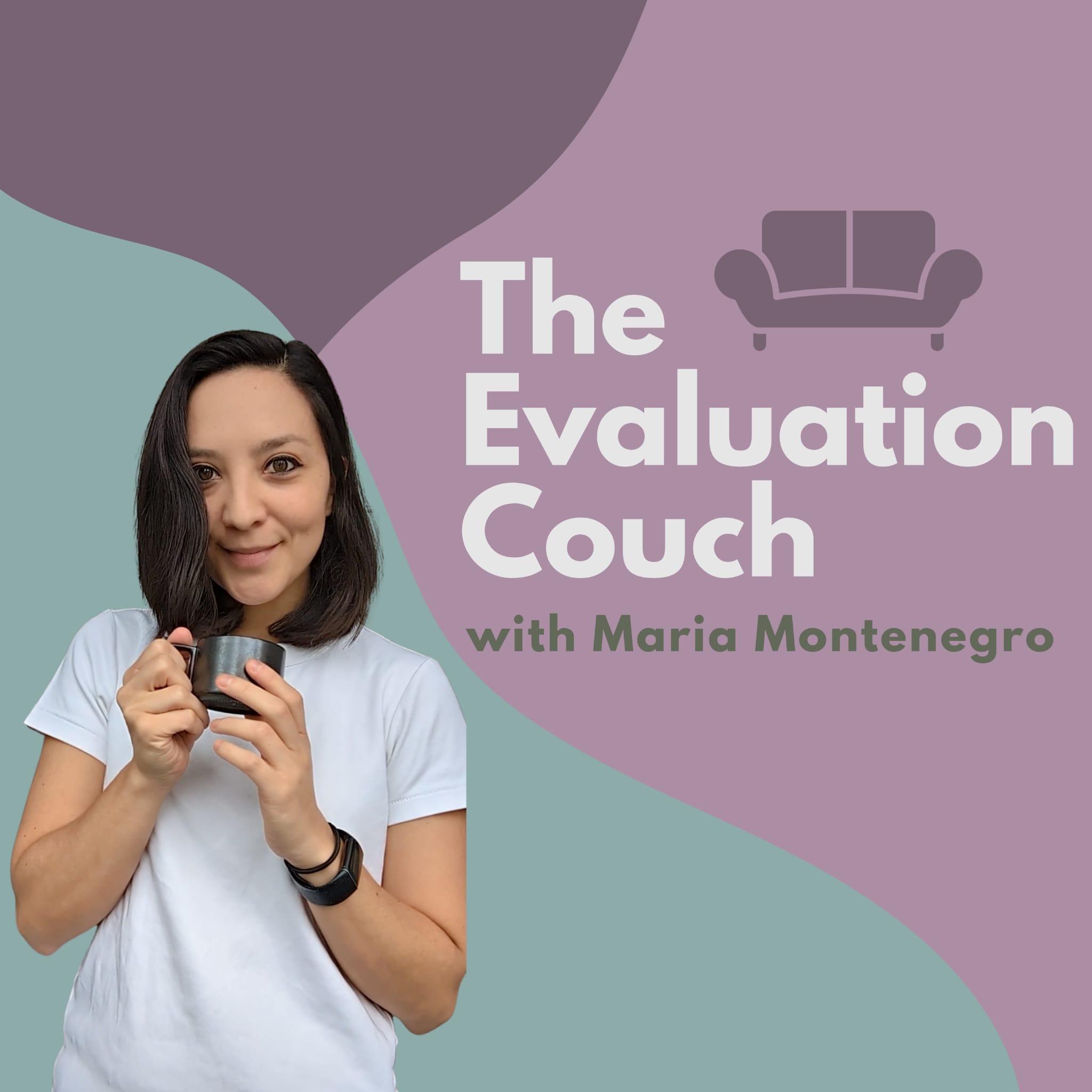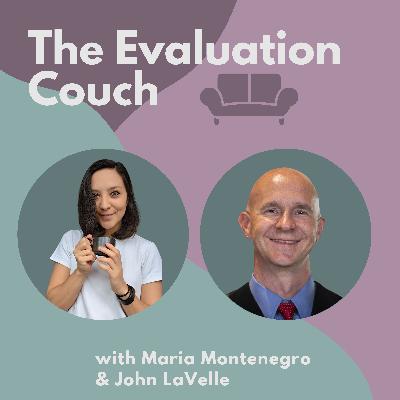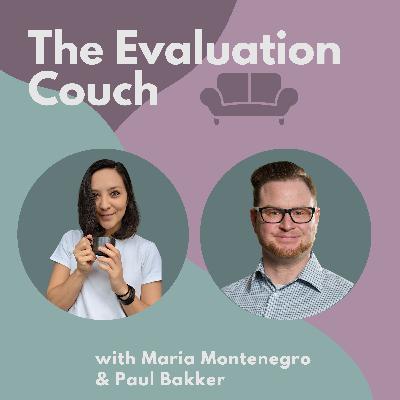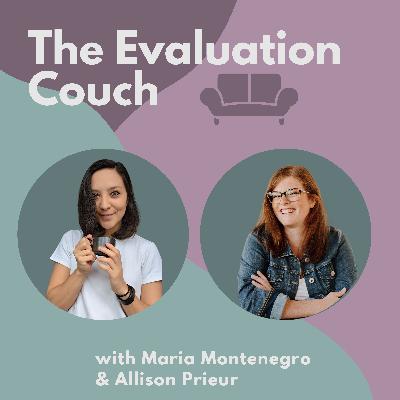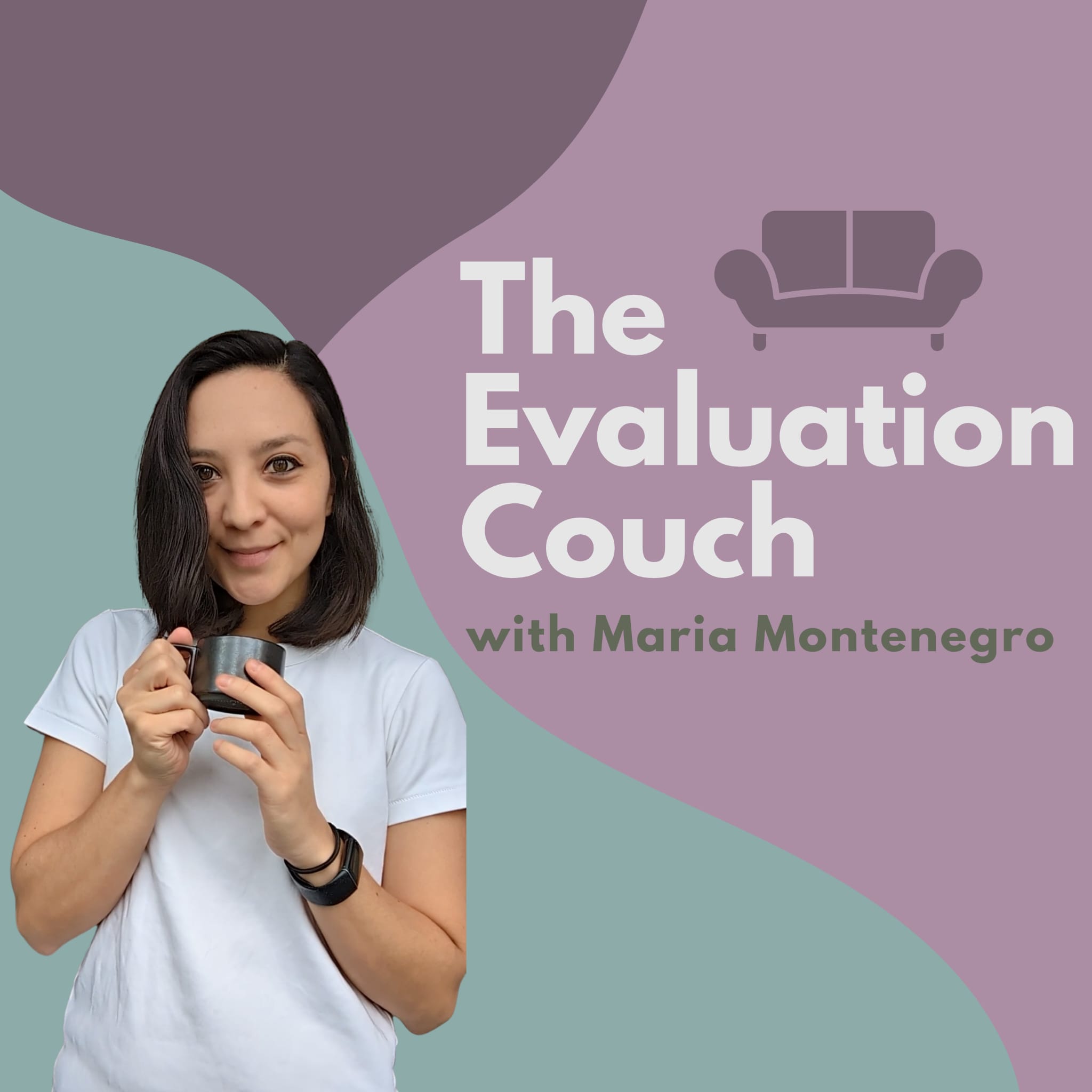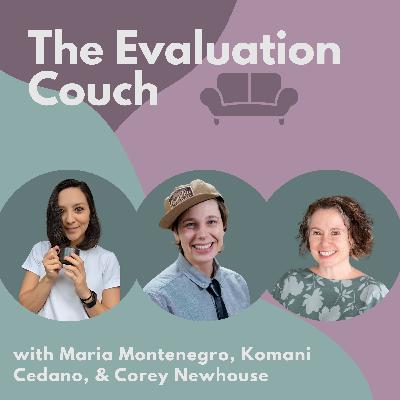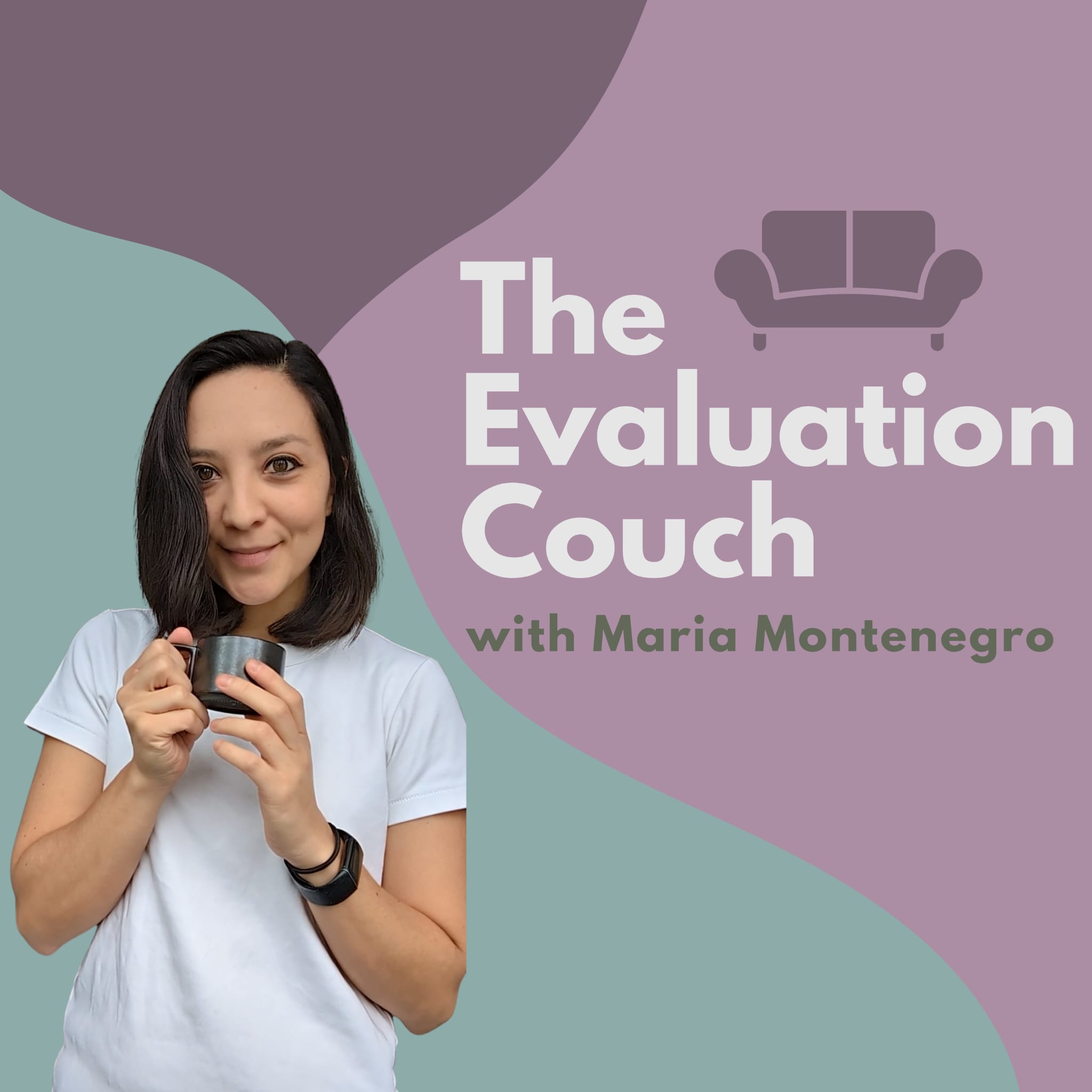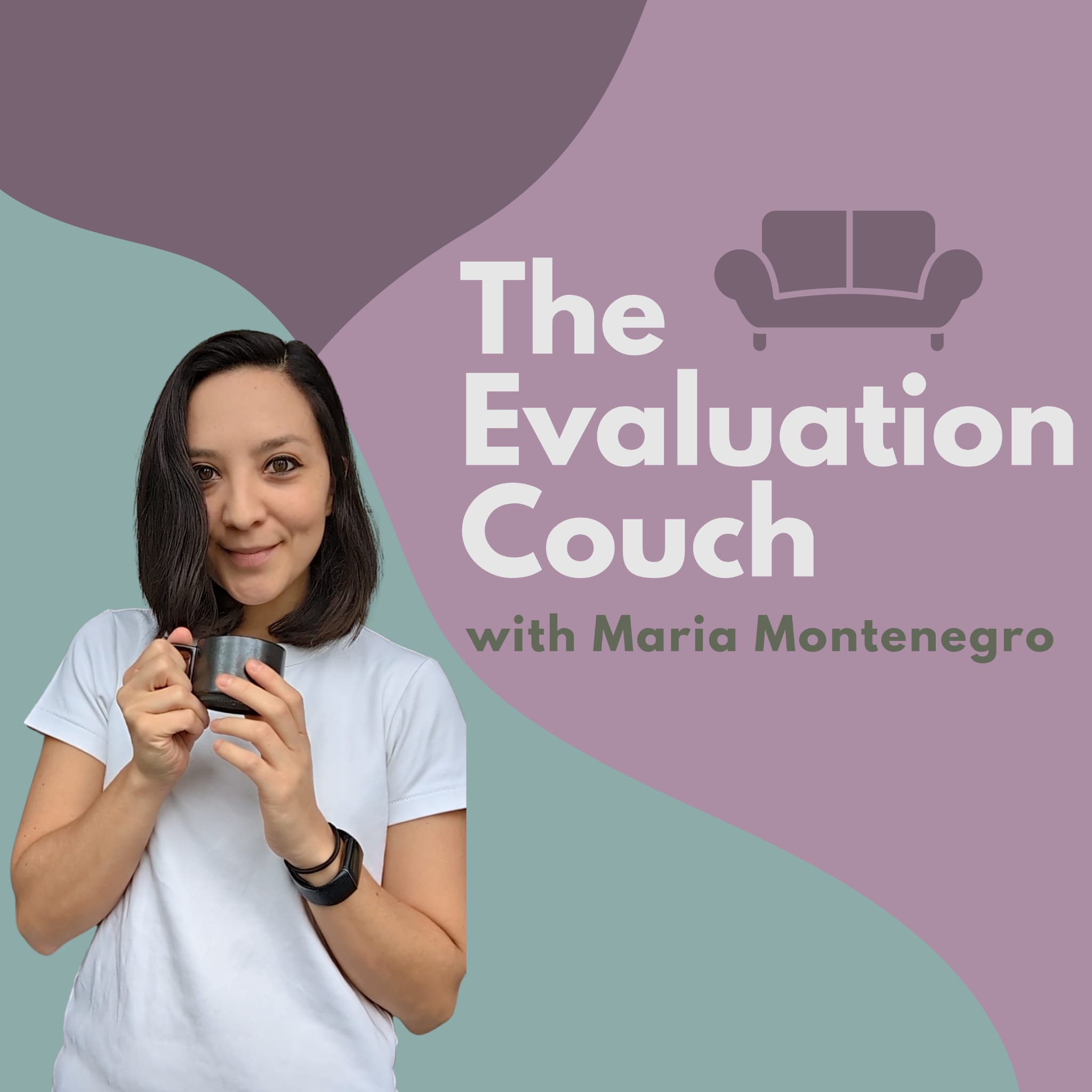Discover The Evaluation Couch
The Evaluation Couch

The Evaluation Couch
Author: Maria Montenegro
Subscribed: 12Played: 156Subscribe
Share
© 2024
Description
Welcome to The Evaluation Couch, where we discuss topics related to evaluation and navigating a career in evaluation. In this space, I will share about my evaluation journey, share tips from my career advising and management experience, and invite other evaluators to hear about their perspectives. My goal is to continue promoting the use of evaluation and help evaluators build the careers they deserve.
58 Episodes
Reverse
In this episode, Maria interviews Slavica Stevanovic from Qatalyst Research Group, about the integration of artificial intelligence in evaluation consulting. Slavica shares how Qatalyst's early investment into technology allowed it to adopt artificial intelligence to streamline processes and deliver client solutions. The discussion covers the implications of artificial intelligence on evaluation consulting, the importance of human judgment and critical thinking, and practical strategies for professionals to stay relevant and adaptable in a rapidly changing field. Resources Check out Qatalyst's reports dicussed in this episode: Beyond the Hype: The Threat AI Poses for Consulting Firms A Survival Guide for Consulting Firms: Responding to the Threat Posed by AI Download your free workbook to become a confident evaluator who attracts top opportunities in 4 steps here. www.mariamontenegro.ca | www.linkedin.com/in/mariamontenegro
In this episode, evaluator Cecilia Eva Beloqui shares her inspiring journey of building visibility and community through daily posting on LinkedIn. She reflects on the discipline and consistency it took to commit to sharing resources every day for a year, the challenges of creating meaningful content, and the powerful connections and collaborations that emerged as a result. Cecilia discusses how curating and amplifying others' work has strengthened her own evaluation practice, helped her communicate more effectively, and opened doors to new opportunities. Her story highlights the value of visibility, generosity, and authentic engagement in shaping both careers and the broader evaluation field. To learn more about Cecilia, follow her on LinkedIn. Download your free workbook to become a confident evaluator who attracts top opportunities in 4 steps here. www.mariamontenegro.ca | www.linkedin.com/in/mariamontenegro
In this episode, Mishkah Teladia shares her journey into a portfolio career, discussing her transition from a long-standing role in international development to exploring diverse opportunities that align with her purpose. She emphasizes the importance of self-discovery, the value of relational intelligence, and the need for flexibility in today's evolving work landscape. Mishkah also reflects on the emotional challenges of navigating career transitions and the joy that comes from integrating work and life. Download your free workbook to become a confident evaluator who attracts top opportunities in 4 steps here. www.mariamontenegro.ca | www.linkedin.com/in/mariamontenegro
In this episode, Maria Montenegro is joined by Kelsi Kriitmaa to explore the concept of portfolio careers. They discuss the evolving landscape of work, particularly in the social impact sector, and how portfolio careers can offer flexibility and diverse opportunities. Kelsi shares her personal journey from a traditional career path that started in evaluation to embracing multiple roles, including coaching, consulting, and community building. The episode covers the challenges and benefits of portfolio careers, offering insights for those considering this path in a rapidly changing job market. Resources Learn more about Kelsi's work and her group coaching program for consulting here. Learn more about Kelsi's coach Amanda Goetz here. Download your free workbook to become a confident evaluator who attracts top opportunities in 4 steps here. www.mariamontenegro.ca | www.linkedin.com/in/mariamontenegro
Live from Eval25 in Kansas City, Maria sits down with Denise Baer, Nathan Varnell, and Nina Sabarre for a dynamic conversation on the future of evaluation. Together, they explore why advocating for evaluation has never been more critical in the face of recent disruptions to the field. The guests reflect on what makes these challenges unique, highlight opportunities to strengthen the case for evaluation, and share practical strategies for communicating its value across diverse spaces. Along the way, they discuss how we can support one another as a community and ensure evaluation continues to thrive in times of disruption. Download your free workbook to become a confident evaluator who attracts top opportunities in 4 steps here. www.mariamontenegro.ca | www.linkedin.com/in/mariamontenegro
In this conversation, Mahesh Krishnan Ramesh shares his journey of pursuing a career in public policy and evaluation. He discusses the cultural challenges of becoming an evaluator in India, the innovative approaches he has taken in his career, and the significance of mentorship and networking. He concludes with valuable advice for emerging evaluators on advocating for evaluation in various sectors. Resources Mahesh4World - YouTube Learn more about Mahesh's FIME awards project here. Download your free workbook to become a confident evaluator who attracts top opportunities in 4 steps here. www.mariamontenegro.ca | www.linkedin.com/in/mariamontenegro
In this episode, Maria shares actionable strategies to help you interview with confidence and land the evaluation roles you're ready for. She breaks down the three most common types of interview questions, what interviewers are really looking for with each, and how to tailor your responses using real evaluation examples. You'll learn a simple framework to structure your answers with clarity and see it in action in real-life examples from interview answers of experienced evaluators. Download your free workbook to become a confident evaluator who attracts top opportunities in 4 steps here. www.mariamontenegro.ca | www.linkedin.com/in/mariamontenegro
This episode focuses on how to answer the common interview question, "Tell me about yourself." Maria explains why this question is important, outlines common mistakes evaluators make when answering this question, and introduces a simple framework for structuring your answer. The episode includes examples from three evaluators, with feedback on what worked and what could be improved. Throughout the episode Maria provides specific examples of how you can answer this question with you edge, communicating what makes you stand out among other evaluators applying for the same role. Download your free workbook to become a confident evaluator who attracts top opportunities in 4 steps here. www.mariamontenegro.ca | www.linkedin.com/in/mariamontenegro
This episode focuses on how evaluators can apply the principles of logic models to their own career development. Maria shares how using logic models to map our our career helps us better understand the inputs, activities, and outputs essential to achieving our career goals. The episode discusses the default logic model most people hold about how their actions lead to outcomes in their careers. She then introduces an extended logic model and discussess each of the inputs, activities, and outputs included in it. The episode underscores the need of constantly revisiting and updating this career logic model to adapt to changing circumstances and goals. *Join The Evaluator's Edge waitlist here to be the first to hear when doors open and get a special discount. Download your free workbook to become a confident evaluator who attracts top opportunities in 4 steps here. www.mariamontenegro.ca | www.linkedin.com/in/mariamontenegro
In this episode, Maria discusses six common myths that can hold back careers in evaluation including the belief that you need a PhD, must specialize, or need to keep collecting credentials to succeed. This episode explores where each of these myths come from, how they impact career growth and satisfaction, and why letting go of them can open up new possibilities. Through real-world examples and practical advice, you'll learn how to navigate your unique path in evaluation with more confidence, clarity, and purpose. Resources: Canadian Evaluation Society Fellows. The Generalist World. GEI Evaluation Competency Framework. *Join The Evaluator's Edge waitlist here to be the first to hear when doors open and get a special discount. Download your free workbook to become a confident evaluator who attracts top opportunities in 4 steps here. www.mariamontenegro.ca | www.linkedin.com/in/mariamontenegro
In this episode, Maria speaks with researcher and evaluation expert John LaVelle about their study on the imposter phenomenon among evaluators. They explore why feelings of imposterism are common among evaluators and how professional identity and community influence these experiences. The conversation highlights the unique challenges evaluators face and the strategies they use to cope with imposterism, emphasizing the importance of mentorship, open dialogue, and community support in fostering confidence and growth. Resources: The research study discussed in this episode can be found here. The book Maria discusses is The Confidence Code by Katty Kay and Claire Shipman. Download your free workbook to become a confident evaluator who attracts top opportunities in 4 steps here. www.mariamontenegro.ca | www.linkedin.com/in/mariamontenegro
In this episode, Paul Bakker joins The Evaluation Couch to share his insights on how a sales pipeline can support an evaluator's independent consulting business. Paul explains how he tracks different types of leads—open RFPs, vendor-of-record opportunities, and sole-source contracts—assigning the likelihood of these materializing into contracts. He shares how he has used a sales pipeline to project his income and guide business development efforts. He emphasizes the importance of networking, building relationships, and diversifying sources of work to maintain income stability and mitigate the risks associated with consulting. Resources Learn about Paul's consulting business Social Impact Squared The AI tools referenced in this episode can be found here: Logical Outcomes Nonprofit AI Workspace Access the American Evaluation Association's Independent Consulting Topical Interest Group videos here Learn more about the Canadian Evaluation Society's Independent Consulting Community of Interest (ICCI) here. Learn about the book Paul referenced by Gail Barrington here. Download your free workbook to become a confident evaluator who attracts top opportunities in 4 steps here. www.mariamontenegro.ca | www.linkedin.com/in/mariamontenegro
In this episode, Allison Prieur joins Maria to discuss her experience participating in the Evaluation Capacity Case Challenge (EC3). Allison shares how she overcome her hesitation to apply to the program and how this experience has changed her evaluation practice. Maria and Allison share their reflections on applying the learnings from EC3 in their practice including the successes and challenges they face as they both try to build evaluation capacity in different settings. Resources: Learn more about Allison's consulting here: About Us — DARE Impact Consulting Learn more about The Evaluation Capacity Case Challenge here: Evaluation Capacity Case Challenge (EC³) | Max Bell School of Public Policy - McGill University Download your free workbook to become a confident evaluator who attracts top opportunities in 4 steps here. www.mariamontenegro.ca | www.linkedin.com/in/mariamontenegro
In this episode, Maria discusses how our brains are designed to make meaning out of our experiences and our place in the world. She shares three personal stories when she held narratives that hindered her career growth. She shares how building her confidence, expanding her knowledge of the field of evaluation, and an unexpected life experience can shift these beliefs. The episode concludes with advice and resources to help others identify and overcome their own limiting stories including Maria's free workbook to become a confident evaluator. Download Maria's free workbook Evaluator Career Edge: 4 Steps to Become a Confident Evaluator Who Attracts Top Opportunities here.
In this episode, Maria shares the importance of detaching one's identity and self-worth from job titles. She discusses how job titles are arbitrary, often don't reflect actual skills or responsibilities, and can negatively impact mental health by fostering unhealthy comparisons. She offers practical tips on how to focus on one's achievements, skills, and contributions instead of job titles, and how to effectively communicate one's value in different contexts. Maria uses her personal experiences and examples to illustrate the harmful effects of over-identifying with job titles and provides strategies for more meaningful ways of introducing ourselves without them.
In this episode, Corey Newhouse and Komani Cedano join Maria to share their experiences and practices to improve compensation in their businesses. They share their personal journeys, challenges faced, and steps taken towards transparent compensation practices, including setting salaries, yearly raises, and benchmarking. They both highlight the need for transparency, equity, and continuous improvement in compensation policies. The episode also offers practical advice for both evaluators and business owners hoping to promote improved compensation practices within evaluation.
In this episode, Maria discusses the importance of adopting a proactive job search approach instead of a passive one to improve employment outcomes. Maria shares four key strategies to improve your job search process: obtaining real-world information about posted jobs, proactively exploring opportunities, accessing the hidden job market, and using strategic visibility. Each of these are detailed with examples from Maria's career and tips to help you implement them into your job search strategy. The meta-analysis referenced in this episode is found here.
In this episode, Maria shares how her participation in the Evaluation Capacity Case Challenge (EC3) was a turning point for her career. EC3 is an experiential learning program hosted by the Max Bell School of Public Policy at McGill University. This program focuses on developing evaluation capacity building skills while supporting real organizations through tailored plans. For four months, Maria represented her organization and worked closely with academics to shape the case challenge provided to participants. In this episode, she discusses four key reflections: embracing curiosity, collaborating with academic perspectives, the value of external assessments, and what it truly means to build evaluation capacity. Resources: Learn more about The Evaluation Capacity Case Challenge here. Learn about the current literature on evaluation capacity building here and more broadly about evaluation capacity building here.
In this episode, Maria reflects on her experiences in academia and how they've shaped her perspective on whether a PhD is needed for a career in evaluation. She shares the moment she first recognized the deep-rooted imposter syndrome in the evaluation community for those without a PhD. She shares her personal academic journey, including a challenging master's thesis in Peru, experiences with supervision, and ethical dilemmas in research. Maria explores her decision-making process of whether to pursue a PhD, weighing career impact, intellectual curiosity, and financial costs. She closes the episode with a call to action, urging evaluators to challenge limiting narratives around academic credentials and define success on their own terms.
In this episode, Maria reflects on her experience of losing her beloved dog and the deeper impact it had on her sense of identity. She draws parallels between how her dog Safi shaped her identity and how our evaluation careers shape our identities. She discusses why change can sometimes bring its own kind of grief throughout our career. She shares five key reminders this period of grief has given her: prioritizing what truly matters, embracing self-care, valuing intentional learning, leaning into your support network, and letting your core values guide you.



